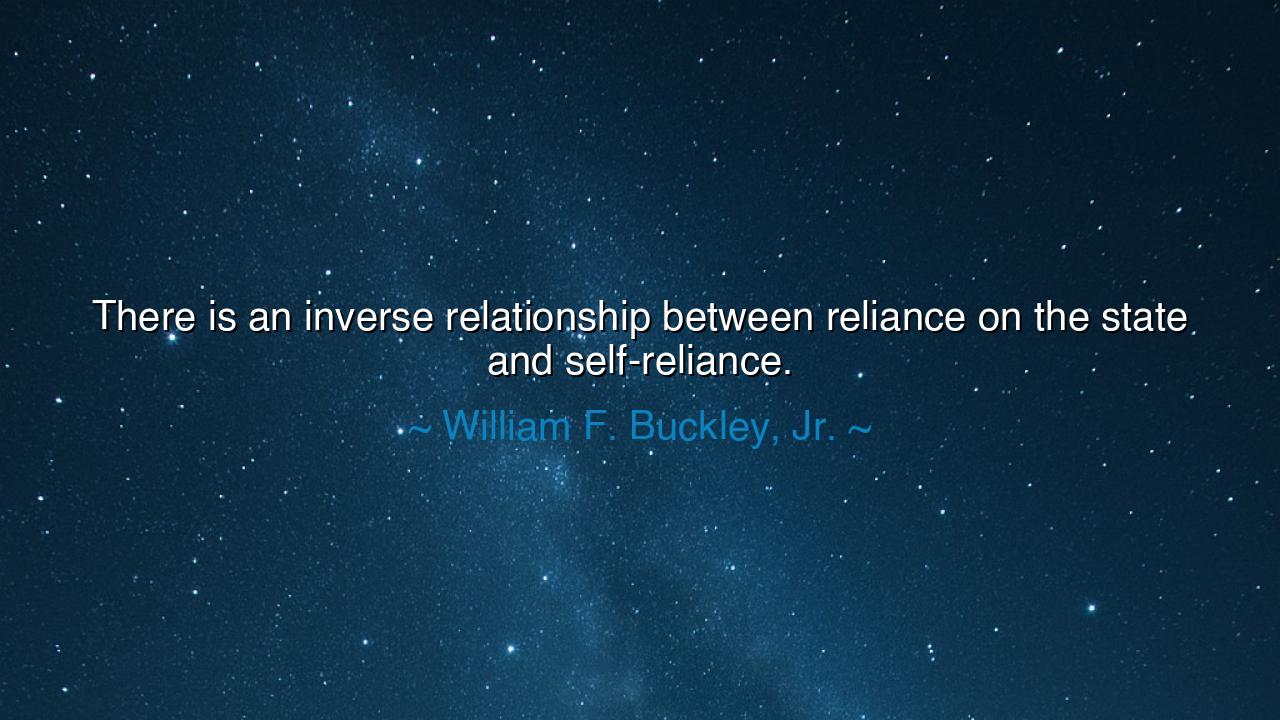
There is an inverse relationship between reliance on the state






Hear the words of William F. Buckley, Jr., philosopher of liberty and defender of the individual spirit: “There is an inverse relationship between reliance on the state and self-reliance.” In this utterance lies a truth that echoes through the history of nations — that as people yield more of their will to the power of government, the flame of self-reliance within them grows dim. Buckley, a man of sharp mind and unwavering conviction, understood that freedom and dependency are opposing forces, and that when one rises, the other falls. The state, though created to serve, can easily become a master; and the citizen, though born free, can become a supplicant if he forgets how to stand on his own feet.
The origin of this quote flows from the heart of Buckley’s lifelong defense of individual liberty and limited government. In the twentieth century, as the modern welfare state expanded, he saw a danger not of tyranny in its violent form, but of soft servitude — the quiet erosion of responsibility beneath the comfort of state protection. Buckley founded the National Review not to tear down government, but to remind men that freedom demands strength, and that reliance on the state, if left unchecked, weakens the very virtues that sustain a republic. His was not the cry of indifference to the poor or the weak, but the call of a wise guardian who knew that dignity cannot flourish where dependency reigns.
The ancients, too, understood this law of the human spirit. Plutarch wrote that the citizens of Rome, once fierce and self-sufficient, became soft as they relied on emperors to feed them. Bread and circuses replaced discipline and virtue, and the empire that once conquered the world fell prey to its own indolence. Buckley’s warning is the same in a modern tongue: when a people look first to the government to solve their troubles, they forget the power that once resided in their own hands. The greater the hand that feeds, the weaker the arm that labors. True self-reliance is not selfishness — it is the courage to bear one’s own burden, to create, to endure, and to serve others not through compulsion, but through choice.
Consider the story of the pioneers who crossed untamed lands to build new lives in the vast wilderness of America. They had no government subsidies, no safety nets, no distant bureaucracy to secure their survival. Their safety was their courage, their welfare their toil, their progress their faith. It was not cruelty that made them strong, but necessity. And from their sweat rose farms, towns, and a nation — a living testament that self-reliance is not the privilege of the rich, but the birthright of the free. Buckley, reflecting on such history, saw that the same virtues that built civilization could just as easily be unlearned when the state became the cradle of dependence.
Yet Buckley’s teaching is not a condemnation of the state itself. The wise know that government has its place — to protect justice, to defend liberty, to ensure peace. But when reliance on the state replaces personal effort, the soul begins to atrophy. The citizen becomes a subject; gratitude turns into entitlement. The very bond that ties people together — mutual responsibility — is replaced by a faceless machinery of redistribution. The ancients would call this a moral decline; Buckley called it the slow undoing of self-reliance, the noblest virtue of a free people.
The heart of his wisdom lies in balance. Just as a tree must be rooted deeply in the earth to withstand storms, so too must a nation be grounded in the self-reliance of its citizens to withstand the temptations of dependency. Compassion without responsibility leads to decay; freedom without discipline leads to chaos. Buckley believed that the state should serve as a safety net, not a cradle; a protector, not a parent. For the man who looks first to himself for strength will, paradoxically, give more to others than the one who forever waits to be given to.
O listener, take this teaching as a guide for your own life. Guard your independence of spirit as you would guard your breath. Accept help when it is just, but do not surrender your will to those who offer comfort in exchange for control. Cultivate self-reliance — not as pride, but as stewardship. Work with your own hands, think with your own mind, and take responsibility for your fate. For a society of strong individuals is the surest defense against tyranny, and a people who depend too much on the state will one day find themselves without freedom, or the strength to reclaim it.
Thus, let William F. Buckley’s words echo across the ages: “There is an inverse relationship between reliance on the state and self-reliance.” Freedom is not sustained by the might of governments, but by the virtue of those who govern themselves. When you build strength within, the world cannot enslave you; when you live by courage, no master can rule you. For the measure of a nation’s greatness is not the reach of its government, but the resilience of its people — and the flame of self-reliance, once lit, must never be allowed to die.






AAdministratorAdministrator
Welcome, honored guests. Please leave a comment, we will respond soon